Setting our clocks in this manner allows us to keep our circadian rhythms on one zone the whole way while allowing us to theoretically maximize the use of daylight for mealtimes (6:00-8:00 for breakfast, 4:00-6:00 for dinner). Since Begonia is battery powered, keeping the cabin lights off helps us make them last longer and it also makes it easier to see outside when it's dark. This usually works pretty well, but New Zealand to Chile is a VERY long way. Our passage crossed eight time zones. When we left, Maryanne was sitting most of her night watch in daylight and I was waking her up for her day watch an hour before it even started getting light out.
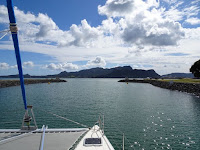

Leaving New Zealand
As soon as we left Whangarei we turned the wrong way. Since South America is way on the other side of the planet, the Great Circle route (the shortest path) plunged away to the southeast to pass within a few hundred miles of Antarctica. Not only is it very cold down there, but the weather can also be violent and unpredictable, so we had no plans to follow that shortest route. A nasty weather system with forty to fifty knot winds was coming from that direction, so we started our passage by going northeast and then north to avoid the worst of it.
Low pressure systems in the Southern Hemisphere turn clockwise, so letting ourselves get pushed along the farther northern side would add miles, but allow us to stay in tailwinds which have a much lower strain per mile on both us and Begonia. The system slowed down as it passed over New Zealand, allowing it to gain strength while we piled on as much sail as we could to keep ourselves moving away from the approaching center in the light winds on the far edge. It was difficult to be starting out on such a long sail so slowly and also watching our total distance to go increasing.
It took a couple of days for the wind to get to us. When it did, we had big seas and tailwinds of thirty knots for several days. With even stronger winds to the south, we angled yet further northward to ride the fine line between them and the calms to the north. At least we were going somewhat in the right direction. During the strongest of it, we were still making six to eight knots surfing down the waves without any sail up at all. The waves collapsing as they broke under Begonia always did so unevenly, causing one hull to drop before the other, which made for a pretty crazy ride. By the time the system had passed over us, we were ready for a break from both being thrown around and having to listen to all of the unsettling noises that accompany such motion.
We were hoping to be able to turn right and angle our way southwards on a more direct course, but the newest forecasts were predicting the development of a tropical storm that would plunge south into our path. To avoid it, we would have to abandon any plans to go east and get south as fast as we could into water that was too cold to support it. We spent over a week sailing into headwinds from the relatively warm waters just north of 30 South into the cold waters of the Roaring Forties. Every watch, about midway through, I would realize the pile of clothing I had worn the previous watch wasn't cutting it, so I'd go down below and find another couple of layers to add. After several days, I was wearing the same outfit I had worn in Antarctica. I was padded so comically that getting through the narrower parts of the boat required getting up a bit of momentum first. I was even wearing multiple hats.




We experienced a mix of weather on the passage, but Kyle's planning kept us from the worst of the systems
Once the tropical system fizzled out, we were finally able to ease the sheets and follow the wind in the direction we wanted to go. Again, we were trying to stay on the edge of a band of howling winds several hundred miles wide. We would have had a faster and shorter passage if we had plunged more deeply into it, but I was willing to sacrifice some speed for comfort and reduced chances of over stressing something on the boat. Every mile further we edged into the forties was unnerving as it increased the likelihood we would encounter rough and changeable weather. Our daily text forecasts were little more then paragraph after paragraph of gale and storm warnings. The Great Southern Ocean seems to be pretty much all gales all of the time. The Antarctic sections always had a horrible sounding blizzard or two - and this was the 'mild' Summer weather.
This was our fist passage since upgrading to the Iridium GO!, coupled with PredictWind, a kind of a wifi router to replace our satellite 'brick' phone, and giving us access to additional weather models. I have now firmly developed a love/hate relationship with it.
The love part is obvious. We now have access to a much broader range of weather data than we did before and our plan lets us connect as often as we like. On such a long passage, particularly in a somewhat scary part of the world like the higher latitudes of the South Pacific, it's good to be able to check different weather models against each other for consistency and then devise an informed plan. We often remarked to each other how much different it would be to be planning our strategy by making big inferences about tiny movements of the barometer needle. On the two occasions we encountered really rough weather, we had plenty of warning and were well-prepared when it finally arrived.
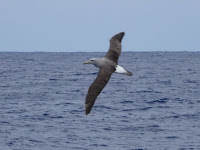
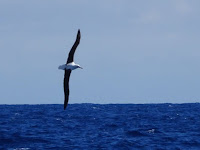


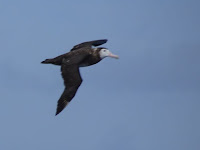

Birds at sea
What we hate about it is that it's a piece of technology like many others today with no obvious mechanism. It's a magic box and all we know is that something is supposed to be going on inside, but we can't know for sure. It is super slow and frustrating, It will drop four calls for every one that goes through, and it likes to do that annoying computer thing where it says it's doing something, but twenty minutes later, you realize it's not even trying and that a little piece of your life is now gone forever. Because of this, and the unlimited data plan, we changed the way we deal with weather downloads. Instead of doing it when we do our morning position reports, I just start it trying as soon as I come on watch so that I have hours to complete the task. Just to give an idea. At the typical speeds we see at sea, a thirty-minute audio file would take about twenty-four hours to download. Their routing software is also just plain stupid. Even if you tell it you want to avoid weather worse than a certain amount, it seems to try to route us on the quickest route to the very edge of the bad weather. I'm glad I have the experience to confidently ignore it most of the time, but I worry about people who would put too much faith in it.
We had a couple of weeks of reasonable weather, albeit a little cold for our tastes. We meandered left and right to stay in the best winds, but were always in the low forties latitude. This was the most remote part of our voyage. We passed only a few hundred miles from Point Nemo, the spot on Earth farthest from any land. We have now sailed in all three of the Earth's regions where it is possible to be more than a thousand miles from anything other than more water. For several days, our nearest land was Easter Island, itself one of the remotest places on Earth. We saw no other vessels either directly or on our AIS display. There wasn't even any static on the radio. The only wildlife we saw the whole time was a lone albatross that would circle nearby for a few hours a couple of times a day. It regularly came right up to the cockpit where I could study its markings. I'm reasonably sure it was the same individual each time. They're such efficient fliers that I only ever saw her flap twice.




Being at sea this long can be dull, but we keep ourselves busy
Fixing things, cooking, keeping our logbook, reading and enjoying the view

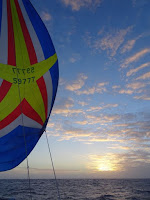


Sunsets and sunrises can be spectacular
We had now been at sea for over a month and still had more than two thousand miles to go. Two thousand miles is a pretty respectable distance to sail and here we were feeling like we were 'almost' there. Man, the Pacific Ocean is big!
Another strong weather system passed to the north of us in the tropics. It gave the South Pacific High a shove and pushed the edge of it in front of us. To keep our wind going, we had to go a few hundred miles even farther south. Now we were so far into the forties that it would take us days to get out if something happened.
Despite the gale warnings all around us, our weather remained relatively nice. Once we found our band of wind again, we resumed a great circle course and had almost direct tailwinds as a long swell rolled under us. At our furthest south, we actually deployed our spinnaker and flew it for a couple of days straight as the skies slowly cleared. Flying a spinnaker in the Roaring Forties – that's nuts! We got as far south as 45º 53'. At that latitude, there are only two pieces of land to interrupt the vast ocean: a few hundred miles of the skinny (but tall) part of South America, and just over a hundred miles of the South Island of New Zealand (also tall). We were thousands of miles from either. On our uncharacteristically calm patch, we had that lovely combination of a slow, smooth motion and exhilarating speeds to eat up some of the remaining miles.
Apart from our regular wave sightings and visits by Bert, 'our' Albatross, we had a few events to break up the trip. First was Christmas. Maryanne woke me for my watch wearing a Santa hat and holding the one she was clearly expecting me to don. We opened our hidden stashes of gifts and Maryanne even produced a Christmas cake that she had pre-sliced at Norsand before we left with a borrowed chainsaw. To top it off, just at sunrise on Christmas day we were also visited by the only pod of dolphins we saw for the whole passage!


Christmas at sea started with a surprise visit from a pod of dolphins!
Next was New Year's, which really seemed like Monday since we had no real-time contact with the outside world and we were using a time zone for the passage that probably has the lowest population of any of them. It was just us and parts of Alaska. Maryanne woke me for my midnight watch by blowing a noisemaker. Unexpected noises are generally a bad way to wake up at sea, but it only took me a millisecond to realize that it was not one of our many scary alarms and was just Maryanne celebrating. Her beaming face made it impossible to be upset.
Next was my mother's 39th -again! We managed to patch a spotty satellite call through both before and after her big surprise party. The weather was pretty bad those days so between all of the background noises and the swinging antenna, we had a hard time staying connected, but I think she got the idea.
By the time we were closing in on the South American coast, we had sailed so far east that my night watch had very little night in it before the sun would start coming up. Finally, on day forty-six, Maryanne woke me with a report that she had just spotted land in the pre-dawn twilight. I emerged from our bunk to see the island of Chiloe, South America's second biggest island (behind Tierra del Fuego). Wow! That was a long damn way. Between the monotony of the big middle bit and the fact that the cold weather had not encouraged a lot of going out on deck to enjoy the clouds and the stars, it in some ways had felt even longer since we had seen anything but sea. Since we each do two watches a day, we had each brushed our teeth and climbed into bed ninety times between our last sight of New Zealand and our first look at South America.
Our first port, Puerto Montt, was still another twenty-four hours of sailing away. We had to pass through Canal Chacao, separating Chiloe from the mainland, We caught the current just at the wrong time and Maryanne spent a whole watch sailing hard just to crawl along as fishing boats, ferries and cargo ships maneuvered nearby. We hadn't seen another boat in weeks and now it seemed there were fleets of them to avoid. We also had sea lions and birds to entertain us in the whirlpool of a channel. On my watch, we accelerated through and got some breathing room for the overnight sail to Puerto Montt.






Land at last!
Once we were within the channels - the wildlife kept us entertained as we pushed against the strong current
ALL of the water in Chile is controlled by the Armada (Navy), not just selected areas, and the rules for navigating within them are both numerous and strict. One of the requirements is that all shipping has to give a detailed position reports to all manned light houses along their route. I was actually kind of looking forward to this as I had been studying Spanish diligently the whole way and had finally declared to Maryanne a few days earlier that I was now completely fluent.
I listened in on the report of the first ship passing through the channel ahead of us. Uh, oh. Between the crackly radio and the ridiculous speed of the exchange, I got maybe two words from each side. No tengo fluencia. My fluency did not appear to extend to the spoken language, which I think is supposed to be the point. What I have seems to be 'billboard fluency', which I'm pretty sure is not even a thing My exchange started okay, but then the lighthouse keeper was obviously so impressed with my command of his language that he went off on some rapid-fire tangent about how much cesium there was in underwater substrates and then he asked me a series of questions about which cookies I preferred as a child and I kind of lost him. As a favor to him so he could stay in practice, we finished in English, of which I also seemed to be losing my grip. Bienvenidos a Chile! The pre-school is that-a way.
Subsequent exchanges with other stations through the night revealed a pattern of just ignoring us once communication broke down. No second or third tries were offered. By the time we finally tied to the dock at Puerto Montt, we weren't sure the Armada had actually received the message that we were coming and were half expecting to be met by a group of angry soldiers. We weren't. Instead, the nice guy at the Marina said he'd call them in the morning and reminded us we were not to leave the boat until we had received clearance into the country. That was fine. We hadn't slept much in the excitement of our arrival and needed a good night's sleep anyway.
{Maryanne: Luckily we'd also emailed our position report and ETA details from about 300 miles off shore, the requirement is that you submit this from 200 miles out, but I was making extra sure!}
Overall, the passage had covered 6,380.5 nautical miles and taken 1,091 hours and 56 minutes. Even without sailing in a straight line, we had sailed well over halfway to the opposite side of the Earth in one sail and on only a portion of one ocean. It's difficult to overstate the size of this massive body of water. It is roughly the size of all of the world's other oceans combined and larger by far than the aggregate of every scrap of land. Sailing for weeks over it's surface gave us a rare glimpse of the very scale of it. That said, it was kind of a strange feeling to be here. It had been so long since we left that we had become used to the idea of it just going on forever. For most of the journey, we dared not think about landfall because it was so far ahead. Now we were here and it felt strangely – sudden.
{Maryanne: Before leaving Mexico a year ago, and again before leaving New Zealand, we'd worked really hard to be sure the boat was up to the strains of the Pacific crossings. We wanted to be sure she was able to look after herself (with help from us) as much as we could without access to external support. While we don't fuss too much over the cosmetics aboard, we do really invest in the critical stuff that might otherwise leave us in trouble, we have a ton of spares and manuals and backup systems aboard. This passage we did indeed have some new issues, but luckily nothing too serious. We had a few new leaks, our wind instrument became totally erratic and unreliable (we had a hand held backup, and would fix it once we could safely get up the mast), and a new bilge pump float switch failed (luckily Kyle found that out on one of his regular checks, it wasn't actually needed in action). Overall we had very little to worry about during the passage.}
We knew of two other boats that were making the same passage as us. The first, a French boat called Shana, we met during our last few days in the yard at Norsand. They had intended to leave a couple of weeks before us, but a valve issue followed by a family emergency had them postponing their departure until we were already about a third of the way across, making us the pathfinder instead of them. We had been sending messages and positions back and forth to keep track of each other. The other boat was one we hadn't met, but Shana knew them. They left the Chatham Islands for Ushuaia about the same time as Shana and the two boats spent much of their passages only a couple of days apart. We sent Shana a message informing them of our arrival as well as some tips on getting settled, etc. We were looking forward to giving them a big welcome. They sent a reply saying that they had very strong winds and that the other boat, which was a bit south of them in even heavier weather, had been hit by a wave and suffered a 360º roll. The boat was fine, but the guy at the helm when it happened had been killed. They were now coming to Puerto Montt instead of going to Ushuaia. We felt terrible and powerless to help. It made us each give the other an extra big hug for having made it.
After arriving at the marina, as we were tidying up, the growing twilight reminded us that our good night's sleep was not to be. In local time, it was already well into tomorrow and we only really had a couple of hours. We got just enough of a nap to feel even worse before a knock on the hull woke us. It was the marina manager coming to tell us the authorities were on their way. We poured some coffee down our throats and struggled to stay awake while we waited as we finished the tidying up jobs we had blown off the night before.
It was a few hours before someone came and summoned us to the marina's conference room. Along the way, I realized I hadn't walked more than five steps in a straight line for weeks. Stamp, stamp, stamp, and we were done with Customs. We went back to the boat for another couple of hours before repeating roughly the same five-minute process with Immigration. Last was SAG, the Agriculture and Wildlife Department. The SAG agent actually came to the boat, examined our stores (all the possibly suspect stuff Maryanne had pulled out and had ready to inspect), asked a few questions and then there was a whole flurry of stamping and signing before we were declared officially in the country and told we were now allowed out of the immediate vicinity of the marina.
One of the papers he had me sign turned out to be a citation for violating one of their rules along with a summons to appear at the SAG offices in two days time to make an official apology. Apparently, we were supposed to provide them twenty-four hours prior to our arrival a list of every port we had been to in the proceeding twenty-four months. We had pre-notified the Armada, but not the SAG office and not with the 24-month list. I guess it's a good thing we were planning on staying in town for a few days anyway.
{Maryanne: Each country has its own rules and regulations for visiting boats to adhere to. Arriving by boat means we have a lot more responsibility to do the right thing than when we arrive by plane and are pushed through the necessary bureaucracy at the airport. We make a huge effort to research the requirements, using cruiser web sites (like noonsite) and guide books, and any other resources we can find. This regulation isn't mentioned anywhere. After the SAG agent left, I hit the internet looking for what I might have missed. Nothing. Later contact with the author of the most recent guide book confirmed we were the only sail boat that he'd heard of being cited, and his research on the rules came to the same conclusion as mine – we were being cited for a failing to conform to a regulation that obviously didn't apply to us. But hey, we were now officially in Chile. Our neighbours, Ledda and Alejandra, came and generously delivered some home-made freshly-baked bread as a welcome and we could finally sleep. – all was good}
